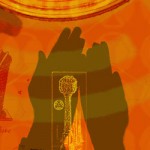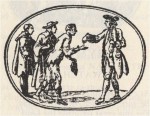A person on the street asks you for a dollar. A fellow traveler on an airplane loses his wallet and asks you to loan him cab fare. Do you say yes? It doesn’t seem to depend on whether you’re rich or poor. Research shows that being richer doesn’t make people more generous. It also shows that we’re more likely to help people we perceive as being similar to us. What causes compassion and generosity? What causes selfishness? In a world with more and more people, fewer resources for us to divide up, and shared catastrophes, the answers to these questions are urgent.
-

TRBQ Podcast #14 — Take My Corpse, Please

Mary Roach wants you to give yourself away. Not yet, though. After you’re dead. She wrote a book called “Stiff,” in which she details what has happened over the years to bodies that were donated—willingly or unwillingly—to science.
“I think that, for many people, does take the edge off it,” Roach says. “You know there is some good coming from something that’s otherwise kind of a bummer.”
-

TRBQ Podcast #13 — Is There Really Altruism?

If you ever doubt that animals have the capacity to share, look no further than chimpanzees and capuchin monkeys.
Frans de Waal studies primates, and he teaches psychology at Emory University. He says says looking at the way other primates share sheds light on the way humans act.
-

TRBQ Podcast #4 — Sharing with strangers

Why do people share? In this episode we hear from Yochai Benkler about his research into people who write Wikipedia articles, and we meet Sam Harnett who moonlights giving people rides — and recording their stories.
-

Giving without expecting something in return is a key part of Maasai life

Give and forget.
This is how one elder describes the way of life that guides the Maasai of East Africa. He speaks not of giving and getting, but of giving and letting go.
The concept is called “osotua,” and its closest English translation would be “umbilical cord.”
It means if someone doesn’t have enough, you give—up to your ability, only as much as they need and without expecting anything in return.
-

Capuchin monkey: Keep your stupid cucumber (Video)
Here’s a short clip of Frans de Waal’s famous fairness experiment with capuchin monkeys. Yes, it turns out, capuchins have a sense of fairness. They’re happy to work for slices of cucumber — until their neighbor gets a grape for doing the same task.
You can see the result.
-

Do volunteers give better blood?

The Memorial Blood Center sets up a table in the University of Minnesota Duluth’s busy bus hub. Every few minutes a student comes by to set up an appointment, and then heads out to the blood drive bus.
In one day, dozens of students volunteer to get stuck in the arm with a needle for nothing but a T-shirt.
The scene isn’t unusual to a modern-day American audience. Not so long ago, though, it would have seemed extraordinary. It was only a few decades ago that the U.S. stopped paying blood donors and started using volunteers.
-

TRBQ Podcast #3 — The joy is in the giving

Money can make you happy. Especially if you give it to someone else. A growing body of research shows that giving money to other people is more likely to make you happy than keeping the money. In this episode, Michael Norton from the Harvard Business School tells Dean about his fascinating research into sharing and generosity.
-

Maybe “goodness” is in our genes

It’s a question that has puzzled philosophers through the centuries: Are humans born good, and then caused by outside forces to do evil, or are we born evil, so that we need to be cajoled and threatened into being good?
Dacher Keltner makes an interesting observation in his book Born to Be Good. He points out that when the theory of natural selection began to gain influence in the 19th century, people had to cast this question in a new light: If evolution is predicated on survival of the fittest, why would a species develop altruistic tendencies? (more…)
-

Empathy: You have to be carefully taught

Whether you’re altruistic or not may depend on what kind of family you grew up in.
TRBQ host Dean Olsher recently talked with Tom Smith at the University of Chicago about his study of altruism and empathy in America.
Smith directs the National Opinion Research Center at the university. Every year, the center does a national survey of social trends.
Recently they looked at altruism, and Smith says they got some results he wasn’t expecting. (more…)
-

Is it human nature to share?

At San Francisco’s Exploratorium, a few eager experimenters stand around a screen with fingers flying. They’re texting, and with each message sent they catch a virtual fish.
There are plenty of virtual fish for everyone, but the same thing happens over and over. And over. And over.
They run out.
(more…)

